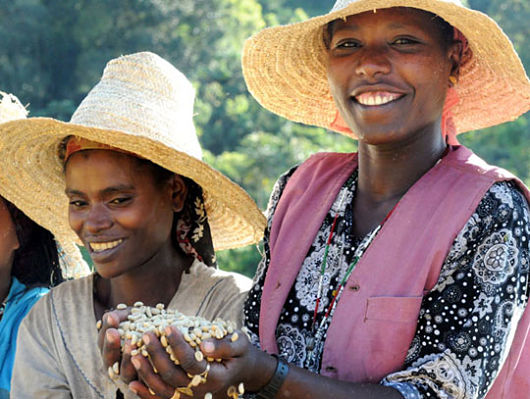Diminishing Poverty Through Improved Coffee Farmers

The Gates Foundation and the company TechnoServe have developed a solution to the endemic poverty of smallholder farmers in Africa — The Coffee Initiative. Across Rwanda, Ethiopia, Kenya, Tanzania and more, the Initiative empowers each wrung of the business ladder involved in the coffee-making process, increasing income and lifting communities out of poverty.
Today, around 4.2 million households of smallholder coffee farmers (20 million households) live below the poverty line.
“Without access to technical knowledge, professional processing and milling services, reliable markets or working capital, these farming families are forced to sell their coffee at low prices. Under these circumstances, it is extremely difficult for these farmers to escape poverty, despite the backbreaking work they put into their coffee harvests,” explains the Gates Foundation on its website, Impatient Optimists.
The Coffee Initiative has helped to break this cycle in many communities. TechnoServe adapts its education programs and implementation strategy to the unique cultural, financial and physical context of each farm.
It aims to help communities realize their potential; East Africa is one of the most conducive places in the world for coffee to grow. Ethiopia, Kenya, Rwanda and Tanzania have rich soil, high altitude and temperate climates, enabling them to produce some of the most high-quality coffee in the world.
To help communities reach their full potential, TechnoServe teaches private, coffee export companies how to work with credit, quality assurance, administration and price risk management.
These export companies then sell their newly acquired services to small coffee cooperative farms, enabling increased effectiveness and efficiency for both farms and service providers.
Every level of business involved in the coffee-making process benefits from TechnoServe’s initiative and has the incentive to continue to implement the new techniques they have learned.
“The smallholder farmers earn more, as they can sell the higher-quality beans for a premium to more reliable markets. (Beneficiaries of the program saw their coffee incomes increase by an average of 22% across the region, while that figure rose to 50% in Rwanda.) The coffee service providers, meanwhile, collect a percentage of the sales and thus have strong incentives to continue providing services and financing to the coffee farmers. And the financial institutions have gained a reliable customer base with a strong record of repayment, encouraging them to continue to provide financing,” explains Impatient Optimists.
Technoserve teaches smallholder farmers how to improve the quality, sustainability and yield size of their coffee. Farmers who participated in the education program increased their coffee yields on average by 42 percent.
TechnoServe has built over 266 wet mills, which process raw beans, since 2000. Over 250,000 farmers have benefited from this. TechnoServe also facilitated lasting relationships between small farms and large, corporate coffee roasting companies, which are now purchasing more coffee from East Africa.
“For instance, the ‘Uzuri African Blend’ from Peet’s Coffee & Tea consists entirely of coffee from Coffee Initiative clients and represents the company’s first African coffee blend. Similarly, high-end coffee roasters Intelligentsia and Stumptown Coffee Roasters have marketed individual Ethiopia wet mill client coffees as single-origin products with the cooperative name displayed on the coffee package,” explains TechnoServe.
The Coffee Initiative has made an enduring impact in Ethiopia. Ethiopians have grown coffee for centuries; however, they previously used traditional, dry processing methods. Little attention was given to quality.
Though the climate and altitude were perfect to produce high-quality beans, the region was known for bad coffee. Farmers received very little for their crops and, subsequently, remained impoverished.
In 2010, the Coffee Initiative took action in Ethiopia. One hundred local farms unified into a cooperative called Duromina. TechnoServe helped them with financial planning and built a wet mill so the coop could fully wash its coffee.
Just two years later, a panel of judges voted Duromina’s coffee the best in Africa. “Buyers from Stumptown Coffee Roasters described Duromina’s coffee as an ‘extremely complex yet clean cup that flaunts notes of lemon, cinnamon, sweet hops, ginger and nectarine accented by jasmine,’” says TechnoServe’s website.
Duromina repaid its loan in just one year, rather than the four-year plan. “In 2012, four major international roasters purchased 71 metric tons of green coffee through direct trade relationships with Duromine, paying an average of $3.68 per pound, a 65 percent premium over the international commodity price,” explains TechnoServe.
The community experienced economic stimulation, and with this new income, were able to improve the quality of life. For instance, the cooperative invested in a bridge. Before it was built, during the rainy season the river would flood and cut off community members’ access to markets and medical clinics.
“So many people were injured falling into the river when attempting to cross during heavy rain. We could not benefit from many government services because of the river, and some pregnant women even died because they could not reach the clinic,” said Nizamu Abamecha to TechnoServe, Duromina’s chairmen. Today, because of the Coffee Initiative, more remote community members are able to cross the river during the rainy season.
Farmers have also been able to invest in tin roofs, new furniture and solar power. Many are now able to send their children to primary school, and some can send their children to even secondary school or college.
– Aaron Andree
Sources: Global Dev Incubator, Impatient Optimists, Technoserve
Photo: TechnoServe
